Dan Gilbert:The surprising science of happiness

[audio:http://akioiwai.com/wp-content/uploads/2015/02/Seth-Godin-No8-201.mp3]
No.08
My friend Red Maxwell has spent the last 10 years fighting against juvenile diabetes. Not fighting the organization that’s fighting it — fighting with them, leading them, connecting them, challenging the status quo because it’s important to him. And the people he surrounds himself with need the connection. They need the leadership. It makes a difference.
You don’t need permission from people to lead them. But in case you do, here it is: they’re waiting, we’re waiting for you to show us where to go next. So here is what leaders have in common. The first thing is, they challenge the status quo. They challenge what’s currently there. The second thing is, they build a culture. A secret language, a seven-second handshake, a way of knowing that you’re in or out. They have curiosity. Curiosity about people in the tribe, curiosity about outsiders. They’re asking questions. They connect people to one another. Do you know what people want more than anything? They want to be missed. They want to be missed the day they don’t show up. They want to be missed when they’re gone. And tribe leaders can do that. It’s fascinating, because all tribe leaders have charisma, but you don’t need charisma to become a leader. Being a leader gives you charisma. If you look and study the leaders who have succeeded, that’s where charisma comes from — from the leading. Finally, they commit. They commit to the cause. They commit to the tribe. They commit to the people who are there.
So I’d like you to do something for me. And I hope you’ll think about it before you reject it out-of-hand. What I want you to do, it only takes 24 hours, is: create a movement. Something that matters. Start. Do it. We need it. Thank you very much. I appreciate it. (Applause)
ボキャブラリー
My friend Red Maxwell has spent the last 10 years fighting against juvenile diabetes. Not fighting the organization that’s fighting it — fighting with them, leading them, connecting them, challenging the status quo because it’s important to him. And the people he surrounds himself with need the connection. They need the leadership. It makes a difference.
You don’t need permission from people to lead them. But in case you do, here it is: they’re waiting, we’re waiting for you to show us where to go next. So here is what leaders have in common. The first thing is, they challenge the status quo. They challenge what’s currently there. The second thing is, they build a culture. A secret language, a seven-second handshake, a way of knowing that you’re in or out. They have curiosity. Curiosity about people in the tribe, curiosity about outsiders. They’re asking questions. They connect people to one another. Do you know what people want more than anything? They want to be missed. They want to be missed the day they don’t show up. They want to be missed when they’re gone. And tribe leaders can do that. It’s fascinating, because all tribe leaders have charisma, but you don’t need charisma to become a leader. Being a leader gives you charisma. If you look and study the leaders who have succeeded, that’s where charisma comes from — from the leading. Finally, they commit. They commit to the cause. They commit to the tribe. They commit to the people who are there.
So I’d like you to do something for me. And I hope you’ll think about it before you reject it out-of-hand. What I want you to do, it only takes 24 hours, is: create a movement. Something that matters. Start. Do it. We need it. Thank you very much. I appreciate it. (Applause)
Red Maxwell: レッド・マクスウェル。
juvenile diabetes: 若年性糖尿病
challenge: vt. 〜について異議を唱える、〜を疑問視する;〜の能力を試す
permission: n. 許可、許諾、承認、認可、同意
curiosity: n. 好奇心、詮索好き
outsider: n. 外部者、部外者、門外漢
more than anything: 何よりも、何にも増して
miss: vt. 〜がいないのを寂しく思う、〜が恋しい
show up: 現れる、姿を見せる
fascinating: a. 魅惑的な、うっとりさせる、興味をそそる
charisma: n. カリスマ性、人を引き付ける指導力
commit: vi. (本気で)取り組む、専念する;(真剣に)関わる、傾倒する;態度をはっきりさせる、言質を与える
cause: n. (人を動かす)理念、信念、大義
reject: vt. (要求・提案・訴えなどを)拒絶する、拒否する、拒む、受け入れない、認めない
out of hand: 手に負えない、手に余って;即座に、きっぱりと〈断るなど〉
matter: vi. 重要である
解説
Red Maxwell レッド・マクスウェル

[audio:http://akioiwai.com/wp-content/uploads/2015/02/Seth-Godin-No7-201.mp3]
No.07
So Tony Hsieh does not run a shoe store. Zappos isn’t a shoe store. Zappos is the one, the only, the best-there-ever-was place for people who are into shoes to find each other, to talk about their passion, to connect with people who care more about customer service than making a nickel tomorrow. It can be something as prosaic as shoes, and something as complicated as overthrowing a government. It’s exactly the same behavior though.
What it requires, as Geraldine Carter has discovered, is to be able to say, “I can’t do this by myself. But if I can get other people to join my Climate Ride, then together we can get something that we all want. We’re just waiting for someone to lead us.”
Michelle Kaufman has pioneered new ways of thinking about environmental architecture. She doesn’t do it by quietly building one house at a time. She does it by telling a story to people who want to hear it. By connecting a tribe of people who are desperate to be connected to each other. By leading a movement and making change. And around and around and around it goes.
So three questions I’d offer you. The first one is, who exactly are you upsetting? Because if you’re not upsetting anyone, you’re not changing the status quo. The second question is, who are you connecting? Because for a lot of people, that’s what they’re in it for: the connections that are being made, one to the other. And the third one is, who are you leading? Because focusing on that part of it — not the mechanics of what you’re building, but the who, and the leading part — is where change comes.
So Blake, at Tom’s Shoes, had a very simple idea. “What would happen if every time someone bought a pair of these shoes I gave exactly the same pair to someone who doesn’t even own a pair of shoes? “This is not the story of how you get shelf space at Neiman Marcus. It’s a story of a product that tells a story. And as you walk around with this remarkable pair of shoes and someone says, “What are those?” You get to tell the story on Blake’s behalf, on behalf of the people who got the shoes. And suddenly it’s not one pair of shoes or 100 pairs of shoes. It’s tens of thousands of pairs of shoes.
ボキャブラリー
So Tony Hsieh does not run a shoe store. Zappos isn’t a shoe store. Zappos is the one, the only, the best-there-ever-was place for people who are into shoes to find each other, to talk about their passion, to connect with people who care more about customer service than making a nickel tomorrow. It can be something as prosaic as shoes, and something as complicated as overthrowing a government. It’s exactly the same behavior though.
What it requires, as Geraldine Carter has discovered, is to be able to say, “I can’t do this by myself. But if I can get other people to join my Climate Ride, then together we can get something that we all want. We’re just waiting for someone to lead us.”
Michelle Kaufman has pioneered new ways of thinking about environmental architecture. She doesn’t do it by quietly building one house at a time. She does it by telling a story to people who want to hear it. By connecting a tribe of people who are desperate to be connected to each other. By leading a movement and making change. And around and around and around it goes.
So three questions I’d offer you. The first one is, who exactly are you upsetting? Because if you’re not upsetting anyone, you’re not changing the status quo. The second question is, who are you connecting? Because for a lot of people, that’s what they’re in it for: the connections that are being made, one to the other. And the third one is, who are you leading? Because focusing on that part of it — not the mechanics of what you’re building, but the who, and the leading part — is where change comes.
So Blake, at Tom’s Shoes, had a very simple idea. “What would happen if every time someone bought a pair of these shoes I gave exactly the same pair to someone who doesn’t even own a pair of shoes? “This is not the story of how you get shelf space at Neiman Marcus. It’s a story of a product that tells a story. And as you walk around with this remarkable pair of shoes and someone says, “What are those?” You get to tell the story on Blake’s behalf, on behalf of the people who got the shoes. And suddenly it’s not one pair of shoes or 100 pairs of shoes. It’s tens of thousands of pairs of shoes.
Tony Hsieh: トニー・シェイ。ザッポス・ドットコムの創業者
run: vt. 〜を運営[経営・管理]する
Zappos: ザッポス・ドットコム。ヘンダーソン(米ネバダ州)に本拠を構える靴を中心としたアパレル関連の通販サイト
the-best-there-ever-was: かつてあった最も良い
into: (be into ~で)〜が好きだ、〜を好む
prosaic: a. 平凡な、単調な、退屈な;想像力に欠ける、つまらない;散文的な
complicated: a. 複雑な、入り組んだ、分かりにくい
overthrow: vt. (政府・指導者)を倒す、崩壊させる、転覆させる
behavior: n. 行動、行儀、挙動;態度;習性
Geraldine Carter: ジェラルディン・カーター。Climate Rideの創設者
Climate Ride: 非営利非課税組織(501c organization)で、イベントへの参加を通して持続可能性や環境運動に対する認識と支持を高めることを目的としている団体。
Michelle Kaufman: ミッシェル・カウフマン。地球に優しいデザインを専門とする建築家およびデザイナー。
pioneer: vt. 〜を開拓する、切り開く;(新しいことなどを)始める、創始する;〜を率先してやる
environmental architecture: 環境建築
be desperate to ~: a. 〜したくてたまらない
go around: 広まる、蔓延する;行き渡る、流行する
offer: vt. 〜を差し出す、提供する
upset: vt. 〔秩序や機能を〕乱す、壊す、駄目にする;動揺させる、困らせる;ひっくり返す、転覆させる
Blake: ブレイク・マイコスキー(Blake Mycoskie)のこと。トムズシューズの創立者。
Tom’s Shoes: 一足の靴が購入されるごとに、靴を必要としている世界の子供たちに新しい靴を贈ることをしている靴メーカー。
Neiman Mrcus: ニーマン・マーカス。アメリカ合衆国で店舗を展開している、ニーマン・マーカス·グループによって運営されているチェーンデパートメントストア。
remarkable: a. 驚くべき、珍しい、並外れた;優れた、卓越した
on one’s behalf: 〜のために、〜の利益になるように
on behalf of ~: 〜のために、〜の利益になるように;〜の代わりに、〜の代理に、〜を代表して
解説
Tony Hsiehトニー・シェイ
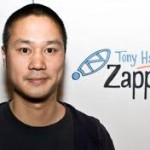
台湾系アメリカ人で、小さい頃から何度も起業。ハーバード大学でコンピュータ・サイエンスを学び、オラクルに入社。オラクル在職時に共同創業したインターネット広告ネットワーク会社のリンクエクスチェンジを、1999年にマイクロソフトに2億6500万ドルで売却(当時24歳)。同年、ザッポス創業に投資家として関わり、やがてCEOとしてほぼゼロから売上高約一〇億ドルを超える企業にまで成長させた。米ブランドウィーク誌で「マーケッター・オブ・ザ・イヤー2010」。
『顧客が熱狂するネット靴店 ザッポス伝説―アマゾンを震撼させたサービスはいかに生まれたか』
ザッポス・ドットコム
http://www.zappos.com/
アメリカとカナダで靴や衣料、アクセサリーなどを販売するネット企業で、靴のオンライン小売でアメリカ最大。1999年にトニー・シェイらの出資を受けて創業され、2009年11月に12億ドルの評価額でアマゾン・ドットコムによって買収される。同社は、みずからを、「靴を売ることになった顧客サービス企業」と称し、カスタマー・サービスを大切にすることで知られる。
Geraldine Carter: ジェラルディン・カーター
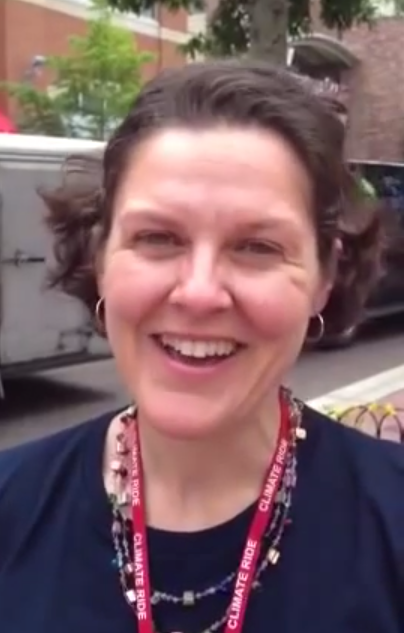
http://www.climateride.org/
https://www.peertopeerforum.com/geraldine-carter/
Climate Ride
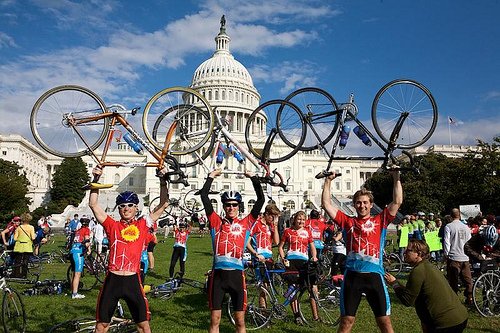
Michelle Kaufman ミッシェル・カウフマン
Blake Mycoskie ブレイク・マイコスキー
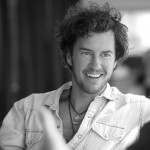
トムズ・シューズ
http://www.toms.com/
http://ssl-tomsshoes.jp/
No.06
The Beatles did not invent teenagers. They merely decided to lead them. That most movements, most leadership that we’re doing is about finding a group that’s disconnected but already has a yearning — not persuading people to want something they don’t have yet.
When Diane Hatz worked on “The Meatrix,” her video that spread all across the internet about the way farm animals are treated, she didn’t invent the idea of being a vegan. She didn’t invent the idea of caring about this issue. But she helped organize people, and helped turn it into a movement.
Hugo Chavez did not invent the disaffected middle and lower class of Venezuela. He merely led them.
Bob Marley did not invent Rastafarians. He just stepped up and said, “Follow me.”
Derek Sivers invented CD Baby, which allowed independent musicians to have a place to sell their music without selling out to the man — to have place to take the mission they already wanted to go to, and connect with each other.
What all these people have in common is that they are heretics. That heretics look at the status quo and say, “This will not stand. I can’t abide this status quo. I am willing to stand up and be counted and move things forward. I see what the status quo is; I don’t like it.” That instead of looking at all the little rules and following each one of them, that instead of being what I call a sheepwalker — somebody who’s half asleep, following instructions, keeping their head down, fitting in — every once in a while someone stands up and says, “Not me.” Someone stands up and says, “This one is important. We need to organize around it.” And not everyone will. But you don’t need everyone. You just need a few people — (Laughter) — who will look at the rules, realize they make no sense, and realize how much they want to be connected.
ボキャブラリー
The Beatles did not invent teenagers. They merely decided to lead them. That most movements, most leadership that we’re doing is about finding a group that’s disconnected but already has a yearning — not persuading people to want something they don’t have yet.
When Diane Hatz worked on “The Meatrix,” her video that spread all across the internet about the way farm animals are treated, she didn’t invent the idea of being a vegan. She didn’t invent the idea of caring about this issue. But she helped organize people, and helped turn it into a movement.
Hugo Chavez did not invent the disaffected middle and lower class of Venezuela. He merely led them.
Bob Marley did not invent Rastafarians. He just stepped up and said, “Follow me.”
Derek Sivers invented CD Baby, which allowed independent musicians to have a place to sell their music without selling out to the man — to have place to take the mission they already wanted to go to, and connect with each other.
What all these people have in common is that they are heretics. That heretics look at the status quo and say, “This will not stand. I can’t abide this status quo. I am willing to stand up and be counted and move things forward. I see what the status quo is; I don’t like it.” That instead of looking at all the little rules and following each one of them, that instead of being what I call a sheepwalker — somebody who’s half asleep, following instructions, keeping their head down, fitting in — every once in a while someone stands up and says, “Not me.” Someone stands up and says, “This one is important. We need to organize around it.” And not everyone will. But you don’t need everyone. You just need a few people — (Laughter) — who will look at the rules, realize they make no sense, and realize how much they want to be connected.
merely: adv. ただ単に、単に、ただ
disconnected: a. (〜から)分離して、隔離して、かけ離れて(from);ばらばらの、一貫性のない、まとまりのない
yearning: n. 憧れ、憧憬、切望、熱望
Diane Hatz: ダイアン・ハッツ。
The Meatrix: ザ・ミートリクス。工場式農業(factory farming)を批判したショートムービー。
farm animal: 家畜
vegan: n. 完全菜食主義者(卵や乳製品も含めて動物性の食物を全く摂らない)
care about ~: 〜を気にかける、大切にする、大事に思う;〜を心配する、気にする:〜に関心がある
issue: n. 問題、論点、争点
organize: vt. 〜を組織化する、整理する、まとめ上げる
turn ~ into …: 〜を…に変える
Hugo Chavez: ウゴ・チャベス(1954〜。ベネズエラ大統領(1999~2013)。陸軍中佐だった1992年、ペレス政権打倒を目指し、反乱部隊を率いて大統領府を攻撃、投獄される。2年後に恩赦で釈放。98年12月の大統領選で当選、事実上のクーデターで辞任させられたがわずか2日で政権に復帰した。
disaffected: a. 不平[不満]のある、反逆心のある
middle class: 中産階級
lower class: 下層階級
Bob Marley: ボブ・マーリー(本名Robert Nesta Marley)。ジャマイカの最も有名なレゲエ音楽家でラスタファリ運動(Rastafari movement)の信奉者(1945~1981年)。
Rastafarian: n. ラスタファリアン(運動)
step up: 上がる、上る
Derek Sivers: デレク・シヴァーズ。CDベイビーの創立者。
invent: vt.
CD Baby: CDベイビー。オンラインのミュージックストア。
independent musician: インディー(independent music、indie)のミュージシャン
sell out: (人などに)事業を売却する(to)
have in common: 共通点がある、共通点を持っている
heretic: n. 異端者、アウトロー
the status quo: 現状
abide: vt. (規則などを)守る、遵守する
be willing to ~: 〜する意思[用意]がある、進んで〜する
sheepwalker: 夢遊病者(sleepwalker)を文字って作った言葉。半分眠ったまま指示に従い、現状に適応している人々。
instruction: n. 指示、指図、命令;教育、訓練
fit in: 適合する、適応する、調和する、合わせる;溶け込む、馴染む、落ち着く
every once in a while: たまに、時々、折々(everyは強調のために付けられている)
make no sense: 意味をなさない、理にかなわない、要領を得ない
解説
Diane Hatz(ダイアン・ハッツ)

The Meatrix → http://www.themeatrix.com/
The Meatrix(字幕付き)→ https://www.youtube.com/watch?v=yyHHFijwO_o
Hugo Chavez(ウゴ・チャベス)

(1954年7月28日〜。ベネズエラ第53代大統領(1999~2013)。陸軍中佐だった1992年、ペレス政権打倒を目指し、反乱部隊を率いて大統領府を攻撃、投獄される。2年後に恩赦で釈放。98年12月の大統領選で当選、事実上のクーデターで辞任させられたがわずか2日で政権に復帰した。
Bob Marley(ボブ・マーリー)

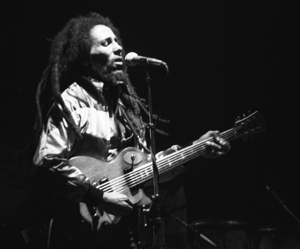
ボブ・マーリー(Bob Marley、1945年2月6日 – 1981年5月11日、出生名ロバート・ネスタ・マーリー Robert Nesta Marley)は、ジャマイカのレゲエミュージシャン。その音楽はラスタファリ運動の思想を背景としており、彼の音楽と思想は数多くの人々に多大な影響を与えた。
ボブ・マーリーの音楽はこちら ↓
https://www.youtube.com/watch?v=K69A1lL1PHQ
Rastafarian(ラスタファリアン)
ラスタファリ運動(Rastafari movement、ラスタファリアニズム(Rastafarianism)とも。ジャマイカを中心とする黒人運動。1930年代にジャマイカの労働者階級と農民中心にして発生した宗教的思想運動である。ラスタファリ運動の実践者は「ラスタファリアン」、または「ラスタピープル」、「ラスタパーソン」、もしくは単に「ラスタ」と呼ぶ。ラスタファリアンはこの宗教運動のことを「主義」(イズム、-ism) ではなく「人生観」(way of life) と考えるため、ラスタファリ運動 (Rastafari movement) と表現される。
Derek Sivers(デレク・シヴァーズ)
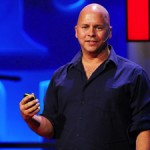
デレク・シヴァーズ 「社会運動はどうやって起こすか」
http://www.ted.com/talks/derek_sivers_how_to_start_a_movement?language=ja
インディーズ(independent music)
インディーズとは、ある業種においてメジャー(大手)に属さず、独立性の高いもののこと。
大手(メジャー)に対して中小のものをマイナーというが、そのマイナーの中でもメジャーと資本関係や人的交流などを深く持たず、系列化されていない独立性の高いものを指す。
英語ではインディー(indie)という。日本でこの意味でインディーズ(indies)というのは和製英語である。
そもそもindiesとは、英語のindependent(自主の)を語源とする語であるindieの複数形であるが、英語ではこの語は東インド諸島を意味し、それ以外の意味を持たない。
No.05
That what we do for a living now, all of us, I think, is find something worth changing, and then assemble tribes that assemble tribes that spread the idea and spread the idea. And it becomes something far bigger than ourselves, it becomes a movement. So when Al Gore set out to change the world again, he didn’t do it by himself. And he didn’t do it by buying a lot of ads. He did it by creating a movement. Thousands of people around the country who could give his presentation for him, because he can’t be in 100 or 200 or 500 cities in each night.
You don’t need everyone. What Kevin Kelley has taught us is you just need, I don’t know, a thousand true fans — a thousand people who care enough that they will get you the next round and the next round and the next round. And that means that the idea you create, the product you create, the movement you create isn’t for everyone, it’s not a mass thing. That’s not what this is about. What it’s about instead is finding the true believers. It’s easy to look at what I’ve said so far, and say, “Wait a minute, I don’t have what it takes to be that kind of leader.”
So here are two leaders. They don’t have a lot in common. They’re about the same age. But that’s about it. What they did, though, is each in their own way, created a different way of navigating your way through technology. So some people will go out and get people to be on one team. And some people will get people to be on the other team.
It also informs the decisions you make when you make products or services. You know, this is one of my favorite devices. But what a shame that it’s not organized to help authors create movements. What would happen if, when you’re using your Kindle, you could see the comments and quotes and notes from all the other people reading the same book as you in that moment. Or from your book group. Or from your friends, or from the circle you want. What would happen if authors, or people with ideas could use version two, which comes out on Monday, and use it to organize people who want to talk about something. Now there is a million things I could share with you about the mechanics here. But let me just try a couple.
ボキャブラリー
That what we do for a living now, all of us, I think, is find something worth changing, and then assemble tribes that assemble tribes that spread the idea and spread the idea. And it becomes something far bigger than ourselves, it becomes a movement. So when Al Gore set out to change the world again, he didn’t do it by himself. And he didn’t do it by buying a lot of ads. He did it by creating a movement. Thousands of people around the country who could give his presentation for him, because he can’t be in 100 or 200 or 500 cities in each night.
You don’t need everyone. What Kevin Kelley has taught us is you just need, I don’t know, a thousand true fans — a thousand people who care enough that they will get you the next round and the next round and the next round. And that means that the idea you create, the product you create, the movement you create isn’t for everyone, it’s not a mass thing. That’s not what this is about. What it’s about instead is finding the true believers. It’s easy to look at what I’ve said so far, and say, “Wait a minute, I don’t have what it takes to be that kind of leader.”
So here are two leaders. They don’t have a lot in common. They’re about the same age. But that’s about it. What they did, though, is each in their own way, created a different way of navigating your way through technology. So some people will go out and get people to be on one team. And some people will get people to be on the other team.
It also informs the decisions you make when you make products or services. You know, this is one of my favorite devices. But what a shame that it’s not organized to help authors create movements. What would happen if, when you’re using your Kindle, you could see the comments and quotes and notes from all the other people reading the same book as you in that moment. Or from your book group. Or from your friends, or from the circle you want. What would happen if authors, or people with ideas could use version two, which comes out on Monday, and use it to organize people who want to talk about something. Now there is a million things I could share with you about the mechanics here. But let me just try a couple.
for a living: 生活のために
worth ~ing: 〜する価値がある
assemble: vt. 〜を集める、〜を作る、〜を集めて整理する
spread: vt. 〜を広める、広げる、拡大させる
Al Gore: アル・ゴア(1948~。米国民主党の政治家。ハーバード大学卒業後、報道班員としてベトナム戦争従軍。新聞記者を経て1977年から下院議員。85年上院に転じる。クリントン政権で副大統領(1993~2001)。2000年の大統領選に出馬し、共和党のジョージ・W・ブッシュと歴史に残る大接戦を演じたが、12月に敗北宣言をした。
set out to:~に着手する、~し始める、~することを目指す
ad: n. (advertisementの短縮形)広告
presentation:【商品企画考えなどについての】説明, 口頭発表, プレゼン(テーション) «on»
Kevin Kelly: ケヴィン・ケリー。雑誌『Wired』の創立編集長。作家、写真家、自然保護活動家。
so far: これまで、今までのところ
in one’s own way: 自分らしい方法で、自己流で、自分なりに、自分の流儀で、独自のやり方で
navigate: vt. (人など)を導く、案内する
inform: vt. 知らせる、伝える、報告する
device: n. 装置、道具、仕掛け、器具
Kindle: 《商標》キンドル(2007年11月米国アマゾン社が発売した携帯型電子書籍端末)
quote: n. (〜からの)引用文[語句](quotation) «from» ; 〖通例~s〗引用符(quotation mark)
mechanics: n. 力学、機械工学;構造、仕組み;決まりきった手順
解説
Kevin Kelly(ケヴィン・ケリー)
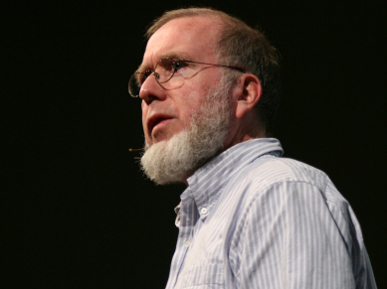
http://kk.org/
http://www.ted.com/talks/kevin_kelly_on_how_technology_evolves#t-628281
http://www.ted.com/talks/kevin_kelly_on_the_next_5_000_days_of_the_web#t-82471
Al Gore

アルバート・アーノルド・”アル”・ゴア・ジュニア(Albert Arnold “Al” Gore, Jr.)
1948年3月31日 生まれ。アメリカ合衆国の政治家。環境問題の論客として知られる。下院議員、上院議員、副大統領を歴任。彼は2000年に大統領に立候補した。全国一斉投票では共和党候補ジョージ・W・ブッシュより得票数で上回ったが、フロリダ州での開票手続きについての問題の後、落選が決定した。
彼の企画した情報スーパーハイウェイ構想に刺激されて、インターネットが爆発的に普及したことは有名である。また、クリントン政権の末期にナノテクノロジーに興味を示し、この研究に対して資金援助した。これが、ナノテクノロジーが世界的に注目されるきっかけになった。
現在では、1970年代からのライフワークとなっている地球温暖化問題について世界的な啓発活動を行っており、この講演の模様をドキュメンタリー化した『不都合な真実』は衝撃をもって受け止められた。イギリスでは、同作の学校での上映差し止めを求める裁判が起こされた。(Wikipediaより)
No.04
But there is good news around the corner — really good news. I call it the idea of tribes. What tribes are, is a very simple concept that goes back 50,000 years. It’s about leading and connecting people and ideas. And it’s something that people have wanted forever. Lots of people are used to having a spiritual tribe, or a church tribe, having a work tribe, having a community tribe. But now, thanks to the internet, thanks to the explosion of mass media, thanks to a lot of other things that are bubbling through our society around the world, tribes are everywhere.
The Internet was supposed to homogenize everyone by connecting us all. Instead what it’s allowed is silos of interest. So you’ve got the red-hat ladies over here. You’ve got the red-hat triathletes over there. You’ve got the organized armies over here. You’ve got the disorganized rebels over here. You’ve got people in white hats making food. And people in white hats sailing boats. The point is that you can find Ukrainian folk dancers and connect with them, because you want to be connected. That people on the fringes can find each other, connect and go somewhere. Every town that has a volunteer fire department understands this way of thinking. (Laughter)
Now it turns out this is a legitimate non-photoshopped photo. People I know who are firemen told me that this is not uncommon. And that what firemen do to train sometimes is they take a house that is going to be torn down, and they burn it down instead, and practice putting it out. But they always stop and take a picture. (Laughter)
You know the pirate tribe is a fascinating one. They’ve got their own flag. They’ve got the eye patches. You can tell when you’re running into someone in a tribe. And it turns out that it’s tribes — not money, not factories — that can change our world, that can change politics, that can align large numbers of people. Not because you force them to do something against their will, but because they wanted to connect.
ボキャブラリー
But there is good news around the corner — really good news. I call it the idea of tribes. What tribes are, is a very simple concept that goes back 50,000 years. It’s about leading and connecting people and ideas. And it’s something that people have wanted forever. Lots of people are used to having a spiritual tribe, or a church tribe, having a work tribe, having a community tribe. But now, thanks to the internet, thanks to the explosion of mass media, thanks to a lot of other things that are bubbling through our society around the world, tribes are everywhere.
The Internet was supposed to homogenize everyone by connecting us all. Instead what it’s allowed is silos of interest. So you’ve got the red-hat ladies over here. You’ve got the red-hat triathletes over there. You’ve got the organized armies over here. You’ve got the disorganized rebels over here. You’ve got people in white hats making food. And people in white hats sailing boats. The point is that you can find Ukrainian folk dancers and connect with them, because you want to be connected. That people on the fringes can find each other, connect and go somewhere. Every town that has a volunteer fire department understands this way of thinking. (Laughter)
Now it turns out this is a legitimate non-photoshopped photo. People I know who are firemen told me that this is not uncommon. And that what firemen do to train sometimes is they take a house that is going to be torn down, and they burn it down instead, and practice putting it out. But they always stop and take a picture. (Laughter)
You know the pirate tribe is a fascinating one. They’ve got their own flag. They’ve got the eye patches. You can tell when you’re running into someone in a tribe. And it turns out that it’s tribes — not money, not factories — that can change our world, that can change politics, that can align large numbers of people. Not because you force them to do something against their will, but because they wanted to connect.
around the corner: すぐ近くに、まじかに、角を曲がったところに
tribe: n. 部族、種族;一団、連中
concept: n. 概念、想念;考え、意見;発想、構想
connect: vt. 〜をつなぐ、結びつける、接続する
thanks to ~: 〜のおかげで、〜の結果
bubble: vi. 泡立つ、沸騰する;ブクブクと音を立てる
homogenize: vt. 〜を均質にする、同質にする
instead: adv. 代わりに、そうせずに、そうではなく、それどころか
allow: vt. 〜に許可する、許す、認める
silo: n. サイロ(家畜飼料・穀物などの保管塔);地下貯蔵庫;(地下)ミサイル格納庫
interest: n. 興味、関心、趣味;利益、利害(関係)
the red-hat ladies: 「赤い帽子の女性」。Red Hat Society(RHS)という社会組織のメンバーの女性たちのこと。
organized: a. 組織的な、組織された;系統的な、整理された
disorganized: a. 組織的でない、混乱した、秩序を欠いた
rebel: n. (~s)反逆者、反乱兵士;反対者、反主流勢力
sail: vt. 〜を帆走させる、操る
fringe: n. へり、末端、縁、周辺、外れ;ふさ、ふさ飾り;前髪
the fringesで【集団・分野などの】少数派、過激派、急進派、傍流
turn out ~: 〜ということが分かる、結局〜であることが分かる
legitimate: a. 合法の、合法的な、適法の;正当な;道理に合った、もっともな
photoshopped: a. (画像が)フォトショップで修正された
Photoshop: n. アドビ社製の画像加工ソフトウェア
tear down:[建物な土を]壊す、取り壊す、解体する
put out: [火・明かりを]消す
pirate: n. 海賊、略奪者;海賊船;著作権侵害者
eye patch: n. 眼帯
politics: n. 政治、政治活動、政界
align: vt. 〜を整列させる、一列に並べる
force A to ~: vt. Aに無理やり〜をさせる、することを強いる
against one’s will: 〜の意志に反して
解説
Red Hat Society
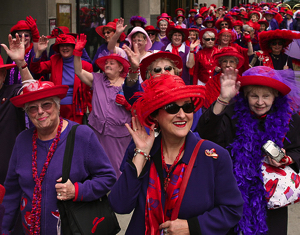
Red Hat Society(RHS)は1998年にアメリカで、50歳以上の女性のための組織として設立された。現在は全ての年齢の女性に解放されていて、国内外に40000以上の支部がある。
No.03
We started with the factory idea: that you could change the whole world if you had an efficient factory that could churn out change. We then went to the TV idea, that said if you had a big enough mouthpiece, if you could get on TV enough times, if you could buy enough ads, you could win. And now we’re in this new model of leadership, where the way we make change is not by using money or power to lever a system, but by leading.
So let me tell you about the three cycles. The first one is the factory cycle. Henry Ford comes up with a really cool idea. It enables him to hire men who used to get paid 50 cents a day and pay them five dollars a day. Because he’s got an efficient enough factory. Well with that sort of advantage you can churn out a lot of cars. You can make a lot of change. You can get roads built. You can change the fabric of an entire country. That the essence of what you’re doing is you need ever-cheaper labor, and ever-faster machines. And the problem we’ve run into is, we’re running out of both. Ever-cheaper labor and ever-faster machines. (Laughter)
So we shift gears for a minute, and say, “I know: television; advertising. Push push. Take a good idea and push it on the world. I have a better mousetrap. And if I can just get enough money to tell enough people, I’ll sell enough.” And you can build an entire industry on that. If necessary you can put babies in your ads. If necessary you can use babies to sell other stuff. And if babies don’t work, you can use doctors. But be careful. Because you don’t want to get an unfortunate juxtaposition, where you’re talking about one thing instead of the other. (Laughter) This model requires you to act like the king, like the person in the front of the room throwing things to the peons in the back. That you are in charge, and you’re going to tell people what to do next. The quick little diagram of it is, you’re up here, and you are pushing it out to the world. This method — mass marketing — requires average ideas, because you’re going to the masses, and plenty of ads. What we’ve done as spammers is tried to hypnotize everyone into buying our idea, hypnotize everyone into donating to our cause, hypnotize everyone into voting for our candidate. And, unfortunately, it doesn’t work so well anymore either. (Laughter)
ボキャブラリー
We started with the factory idea: that you could change the whole world if you had an efficient factory that could churn out change. We then went to the TV idea, that said if you had a big enough mouthpiece, if you could get on TV enough times, if you could buy enough ads, you could win. And now we’re in this new model of leadership, where the way we make change is not by using money or power to lever a system, but by leading.
So let me tell you about the three cycles. The first one is the factory cycle. Henry Ford comes up with a really cool idea. It enables him to hire men who used to get paid 50 cents a day and pay them five dollars a day. Because he’s got an efficient enough factory. Well with that sort of advantage you can churn out a lot of cars. You can make a lot of change. You can get roads built. You can change the fabric of an entire country. That the essence of what you’re doing is you need ever-cheaper labor, and ever-faster machines. And the problem we’ve run into is, we’re running out of both. Ever-cheaper labor and ever-faster machines. (Laughter)
So we shift gears for a minute, and say, “I know: television; advertising. Push push. Take a good idea and push it on the world. I have a better mousetrap. And if I can just get enough money to tell enough people, I’ll sell enough.” And you can build an entire industry on that. If necessary you can put babies in your ads. If necessary you can use babies to sell other stuff. And if babies don’t work, you can use doctors. But be careful. Because you don’t want to get an unfortunate juxtaposition, where you’re talking about one thing instead of the other. (Laughter) This model requires you to act like the king, like the person in the front of the room throwing things to the peons in the back. That you are in charge, and you’re going to tell people what to do next. The quick little diagram of it is, you’re up here, and you are pushing it out to the world. This method — mass marketing — requires average ideas, because you’re going to the masses, and plenty of ads. What we’ve done as spammers is tried to hypnotize everyone into buying our idea, hypnotize everyone into donating to our cause, hypnotize everyone into voting for our candidate. And, unfortunately, it doesn’t work so well anymore either. (Laughter)
factory: n. 工場、製造所
efficient: a. 効率の良い、効率的な、高効率の、効果的な、有効な
churn out: 〜を乱造する、垂れ流す、大量生産する、量産する
mouthpiece: n. (菅・容器などの)口、口金;マウスピース
lever: vt. (てこで)〜を動かす、持ち上げる、こじ開ける、転がす(up, off)
cycle: n. 周期、サイクル、循環、繰り返し
Henry Ford: ヘンリー・フォード。《米国》1863-1947。自動車王。大量生産方式を採用した Model T 自動車で米自動車界を席捲、米自動車生産の60%にまで達した(1927年までに1500万台を販売)
come up with ~: (アイデアなどを)思い付く、考え付く、考え出す;(答えなどを)見つけ出す
enable: vt. 〜を可能にする、〜が(…)できるようにする
fabric: n. 骨組み、仕組み、基礎構造;建材、素材;織り方、編み方
ever-cheaper: a. かつてない安さの
ever-faster: a. かつてない速さの
run into ~: 偶然[思いがけなく・ばったり]〜に出会う、〜に出くわす[遭遇する];〜にぶつかる、ぶちあたる
run out of ~: 〜を使い果たす、(品物などを)切らす、(時間などが)なくなる
shift gear: ギアを変える
mousetrap: n. ネズミ捕り
juxtaposition: n. 並列、並置、並べること、並記
instead of ~: 〜の代わりに
peon: n. (中南米の)農場[日雇い]労働者;(米・けなして)こき使われる労働者
in charge: (人が物を)管理して、監督して、統括して、仕切って、掌握して;(仕事などを)担当して;責任を負って、責任者で
mass marketing: ますマーケティング、大量販売、大量生産
the masses: n. 一般大衆、庶民
spammer: n. スパマー、スパムを送信する人、スパム業者
hypnotize: vt. 〜に催眠術をかける、うっとりさせる、〜の心を奪う
donate: vi. (…に)寄付[寄贈、提供]する(to ~)
vote for ~: 〜に賛成の投票をする
解説
ヘンリー・フォード
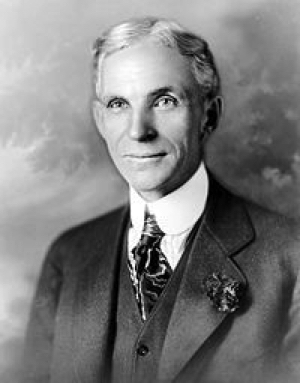
(Henry Ford 、1863年7月30日 – 1947年4月7日)は、アメリカ合衆国出身の企業家、自動車会社フォード・モーターの創設者であり、工業製品の製造におけるライン生産方式による大量生産技術開発の後援者である。フォードは自動車を発明したわけではないが、アメリカの多くの中流の人々が購入できる初の自動車を開発・生産した。カール・ベンツが自動車の産みの親であるなら、自動車の育ての親はヘンリー・フォードとなる。T型フォードは、世界で累計1,500万台以上も生産され、産業と交通に革命をもたらした。フォード・モーターの社主として、世界有数の富豪となり、有名人となった。安価な製品を大量生産しつつ労働者の高賃金を維持する「フォーディズム」の創造者である。フォードはまた、消費者優先主義が平和の鍵だというグローバルなビジョンを持っていた。体系的なコスト削減を強力に推進し、多くの技術革新やビジネス上の革新をもたらした。例えば、北米全土および世界の主要都市にフランチャイズシステムによる販売店網を確立した。遺産のほとんどをフォード財団に遺したが、遺族がその組織を恒久的に運営できるよう手配した。
第一次世界大戦のころには平和主義を主張したことで知られているが、『国際ユダヤ人』という書籍を出版するなど反ユダヤ主義者としても知られている。(ウィキペディアより)
フォードモデルT(1917年型)
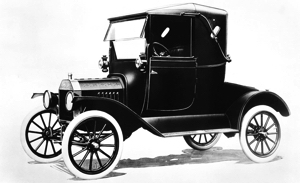
No.02
First, about a guy named Nathan Winograd. Nathan was the number two person at the San Francisco SPCA. And what you may not know about the history of the SPCA is, it was founded to kill dogs and cats. Cities gave them a charter to get rid of the stray animals on the street and destroy them. In a typical year four million dogs and cats were killed, most of them within 24 hours of being scooped off of the street. Nathan and his boss saw this, and they could not tolerate it. So they set out to make San Francisco a no-kill city: create an entire city where every dog and cat, unless it was ill or dangerous, would be adopted, not killed. And everyone said it was impossible. Nathan and his boss went to the city council to get a change in the ordinance. And people from SPCAs and humane shelters around the country flew to San Francisco to testify against them — to say it would hurt the movement and it was inhumane. They persisted. And Nathan went directly to the community. He connected with people who cared about this: nonprofessionals, people with passion. And within just a couple years, San Francisco became the first no-kill city, running no deficit, completely supported by the community. Nathan left and went to Tompkins County, New York — a place as different from San Francisco as you can be and still be in the United States. And he did it again. He went from being a glorified dogcatcher to completely transforming the community. And then he went to North Carolina and did it again. And he went to Reno and he did it again.
And when I think about what Nathan did, and when I think about what people here do, I think about ideas. And I think about the idea that creating an idea, spreading an idea has a lot behind it. I don’t know if you’ve ever been to a Jewish wedding, but what they do is, they take a light bulb and they smash it. Now there is a bunch of reasons for that, and stories about it. But one reason is because it indicates a change, from before to after. It is a moment in time. And I want to argue that we are living through and are right at the key moment of a change in the way ideas are created and spread and implemented.
ボキャブラリー
First, about a guy named Nathan Winograd. Nathan was the number two person at the San Francisco SPCA. And what you may not know about the history of the SPCA is, it was founded to kill dogs and cats. Cities gave them a charter to get rid of the stray animals on the street and destroy them. In a typical year four million dogs and cats were killed, most of them within 24 hours of being scooped off of the street. Nathan and his boss saw this, and they could not tolerate it. So they set out to make San Francisco a no-kill city: create an entire city where every dog and cat, unless it was ill or dangerous, would be adopted, not killed. And everyone said it was impossible. Nathan and his boss went to the city council to get a change in the ordinance. And people from SPCAs and humane shelters around the country flew to San Francisco to testify against them — to say it would hurt the movement and it was inhumane. They persisted. And Nathan went directly to the community. He connected with people who cared about this: nonprofessionals, people with passion. And within just a couple years, San Francisco became the first no-kill city, running no deficit, completely supported by the community. Nathan left and went to Tompkins County, New York — a place as different from San Francisco as you can be and still be in the United States. And he did it again. He went from being a glorified dogcatcher to completely transforming the community. And then he went to North Carolina and did it again. And he went to Reno and he did it again.
And when I think about what Nathan did, and when I think about what people here do, I think about ideas. And I think about the idea that creating an idea, spreading an idea has a lot behind it. I don’t know if you’ve ever been to a Jewish wedding, but what they do is, they take a light bulb and they smash it. Now there is a bunch of reasons for that, and stories about it. But one reason is because it indicates a change, from before to after. It is a moment in time. And I want to argue that we are living through and are right at the key moment of a change in the way ideas are created and spread and implemented.
Nathan Winograd: ネイサン・ウィノグラッド。アメリカ人の作家、映画制作者、動物の弁護士、the No Kill Advocacy Center所長
SPCA: = Society for the Prevention of Cruelty to Animals(動物虐待防止協会)
found: vt. 〜を設立する、建てる、創立する;〜に基礎を置く
charter: n. 特許(状)、免許書(状)、認可状;特権、特別免除
get rid of ~: 〜を駆除する、取り除く、処分する、一掃する
stray: a. 道に迷った、はぐれた、それた
stray animal: 迷い動物(野良犬・野良猫など)
destroy: vt. (動物)を殺処分する、殺す;〜を破壊する、壊す、滅ぼす
typical: a. 標準的な、典型的な、普通の、いつもの
scoop: vt. 〜をかき集める、すくい取る
off of ~: 〜から
tolerate: vt. 〜を大目に見る、黙認する、許す、許容する;〜を我慢する、〜に耐える
set out to ~: 〜することを目指す、〜しようとする、〜し始める
no-kill: n. ノーキル【ペットなどを殺さない動物保護またはその設備】
unless: conj. 〜でない限り、〜しない限り、〜の場合を除いては、もし〜でなければ
adopt: vt. (人・動物など)を引き取る、〜を養子にする、(習慣など)を取り入れる
city council: 市議会
ordinance: n. (主に都市の)条例
humane: a. 人道的な、慈悲深い、苦痛を与えない
shelter: n. (ケガをした動物などの)保護施設[センター]
around the country: 国中の
testify against ~: vi. 〜に不利な証言をする
inhumane: a. 非人道的な、無慈悲な;残酷な、残虐な
persist: vi. しつこく主張する、言い張る;あくまでやり通す、押し通す
nonprofessional: a. 本職でない、プロでない、素人の、ノンプロの
run: vt. (費用などが)かかる
deficit: n. 不足額、赤字、欠損
glorified: a. 見せかけの、実際より良く見せた
dogcatcher: n. 野犬捕獲者、野犬捕獲人
transform: vt. 〜を変貌させる、すっかり変える、一変させる
spread: vt. 〜を広める、広げる、拡大させる、普及させる
Jewish: a. ユダヤ人の、ユダヤ教の
light bulb: 電球
smash: vt. 〜を粉砕する、粉々にする
indicate: vt. 〜を示す、表示する、表す
implement: vt. 〜を実行する、履行する
解説
Nathan Winograd(ネイサン・ウィノグラッド)
http://www.nathanwinograd.com/
https://www.facebook.com/nathanwinograd
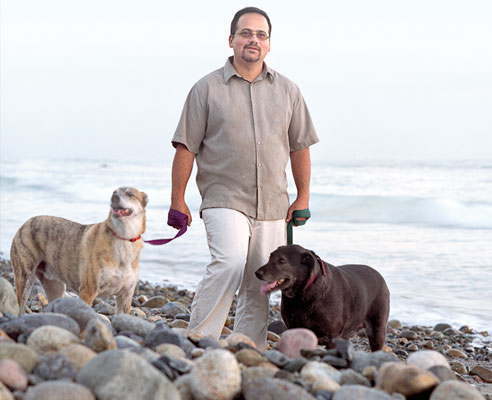

No.01
So sometimes I get invited to give weird talks. I got invited to speak to the people who dress up in big stuffed animal costumes to perform at sporting events. Unfortunately I couldn’t go. But it got me thinking about the fact that these guys, at least most of them, know what it is that they do for a living. What they do is they dress up as stuffed animals and entertain people at sporting events.
Shortly after that I got invited to speak at the convention of the people who make balloon animals. And again, I couldn’t go. But it’s a fascinating group. They make balloon animals. There is a big schism between the ones who make gospel animals and porn animals, but — (Laughter) they do a lot of really cool stuff with balloons. Sometimes they get in trouble, but not often. And the other thing about these guys is, they also know what they do for a living. They make balloon animals.
But what do we do for a living? What exactly do the people watching this do every day? And I want to argue that what we do is we try to change everything. That we try to find a piece of the status quo –something that bothers us, something that needs to be improved, something that is itching to be changed — and we change it. We try to make big, permanent, important change. But we don’t think about it that way. And we haven’t spent a lot of time talking about what that process is like. And I’ve been studying it for a couple years. And I want to share a couple stories with you today.
ボキャブラリー
So sometimes I get invited to give weird talks. I got invited to speak to the people who dress up in big stuffed animal costumes to perform at sporting events. Unfortunately I couldn’t go. But it got me thinking about the fact that these guys, at least most of them, know what it is that they do for a living. What they do is they dress up as stuffed animals and entertain people at sporting events.
Shortly after that I got invited to speak at the convention of the people who make balloon animals. And again, I couldn’t go. But it’s a fascinating group. They make balloon animals. There is a big schism between the ones who make gospel animals and porn animals, but — (Laughter) they do a lot of really cool stuff with balloons. Sometimes they get in trouble, but not often. And the other thing about these guys is, they also know what they do for a living. They make balloon animals.
But what do we do for a living? What exactly do the people watching this do every day? And I want to argue that what we do is we try to change everything. That we try to find a piece of the status quo –something that bothers us, something that needs to be improved, something that is itching to be changed — and we change it. We try to make big, permanent, important change. But we don’t think about it that way. And we haven’t spent a lot of time talking about what that process is like. And I’ve been studying it for a couple years. And I want to share a couple stories with you today.
weird: a. 奇妙な、変な、変わった
dress up in ~: 〜でドレスアップする、着飾る、盛装する、飾り立てる
stuffed animal: n. 動物のぬいぐるみ
costume: n. 衣装、扮装、着ぐるみ
perform: vi. 演じる、上演する
sporting event: スポーツ・イベント、スポーツ競技、スポーツ行事
for a living: 生活のために
convention: n. 大会、集会、代表者会議、協議会
balloon animal: 風船で作った動物
fascinating: a. 興味をそそる、魅力的な、うっとりさせる、強く心を捕える
schism: n. 分裂、分派、派閥
porn: n. ポルノ、【形容詞的に】ポルノの
get in trouble: トラブル[面倒なこと・厄介ごと]に巻き込まれる、災難に見舞われる
the status quo: 現状(維持)、状況、情勢、そのままの状態、体制
bother: vt. 〜を悩ます、困らせる、困惑させる
itch: vi. [通例be itching to do/ for ~]〜したくてたまらない、〜が欲しくてたまらない
that way: そのように、あのように、そんなふうに
spend: vt. (時間)を使う、費やす【注】spend a week (in) writing a paper(レポートの作成に1週間を費やす)のように動名詞を従える場合, 前置詞は省略されることが多い)
process: n. 過程、進行、経過;手順、方法、工程、製法
a couple: = a couple of ~ 2,3の、少数の、いくつかの
解説
セス・ゴーディン(Seth Godin、1960年7月10日 – )

アメリカ合衆国の著作家。マーケティングに関する著作で知られ、パーミッション・マーケティングの提唱者とされる。
代表作『「紫の牛」を売れ!』は世界的なベストセラーとなる。
公式サイト→ http://www.sethgodin.com/sg/
著作 → セス・ゴーディンの著作
『「紫の牛」を売れ!』